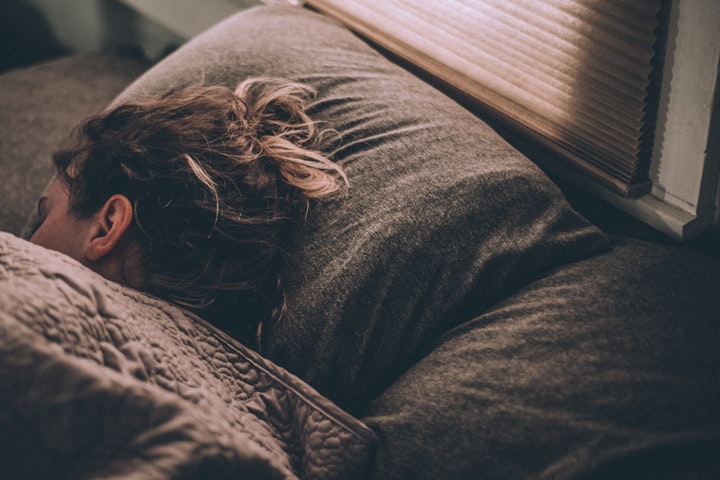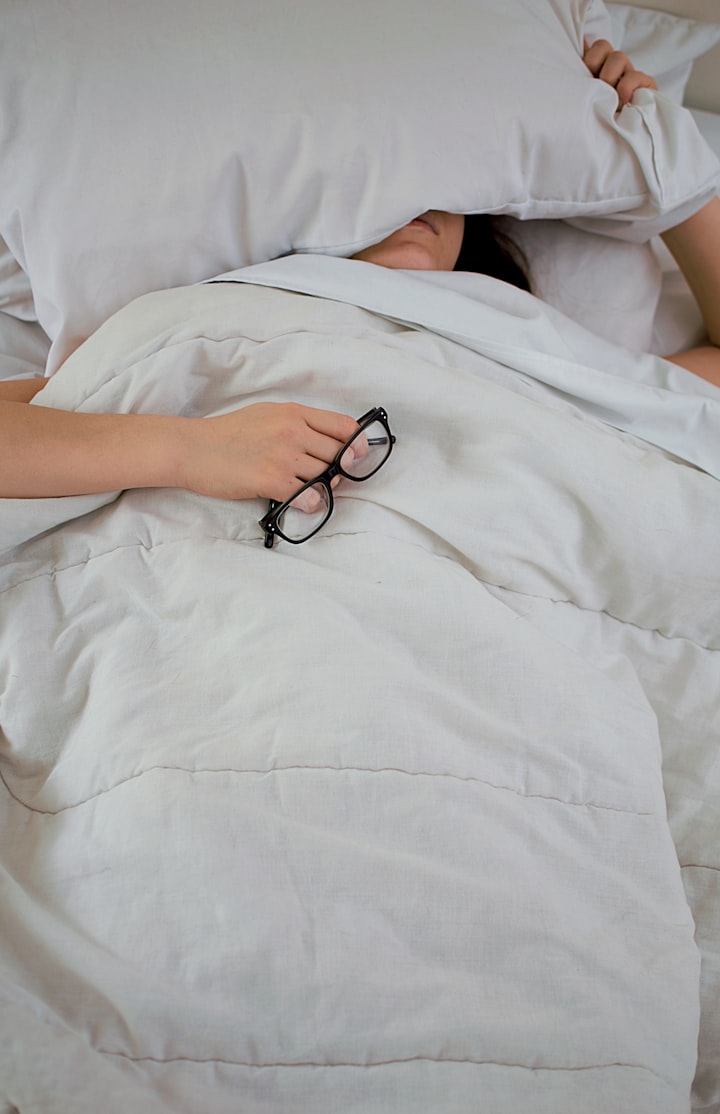DON’T SNOOZE ON SLEEP
Why Getting Enough Rest Is Crucial for Your Physical and Mental Well-Being

Introduction
Sleep is an essential part of human life and plays a vital role in maintaining our physical and mental health. However, in today’s fast-paced world, many people prioritize work and social life over getting enough sleep, which can lead to various health issues. In this article, let’s explore the importance of sleep for human health and performance.
The Basics of Sleep
What is sleep?
We all know the feeling of waking up from a good night’s sleep: refreshed, energized, and ready to take on the day. But what exactly is sleep, and why do we need it?
Sleep is a natural state of rest in which the body’s sensory system and voluntary muscles are inactive. During sleep, the body repairs and rejuvenates itself.
In scientific terms, sleep is a naturally recurring state of rest in which our body’s sensory system and voluntary muscles are temporarily inactive. It’s a time when our brain and body can focus on repairing and rejuvenating themselves, helping us feel physically and mentally restored when we wake up.

How much sleep do we need?
It’s a common question with no one-size-fits-all answer: how much sleep do we really need? The amount of sleep each person needs can vary depending on factors such as age, lifestyle, and genetics. However, the National Sleep Foundation has provided some general guidelines for recommended sleep durations based on age:
Newborns (0–3 months): 14–17 hours
Infants (4–11 months): 12–15 hours
Toddlers (1–2 years): 11–14 hours
Preschoolers (3–5 years): 10–13 hours
School-age children (6–13 years): 9–11 hours
Teenagers (14–17 years): 8–10 hours
Adults (18–64 years): 7–9 hours
Older adults (65+ years): 7–8 hours
While these guidelines can be a helpful starting point, it’s important to remember that everyone’s sleep needs are unique. Some people may feel rested and alert after just 6 hours of sleep, while others may need a full 9 hours to feel their best. It’s all about finding what works best for your body and lifestyle.

What happens during sleep?
While we’re sleeping, our body goes through several stages of sleep, each with its own unique characteristics. These stages are often divided into two main categories: rapid eye movement (REM) sleep and non-REM (NREM) sleep.
During NREM sleep, our body goes through three different stages:
Stage 1: This is the transition stage between wakefulness and sleep. Our muscles start to relax, and our breathing and heart rate begin to slow down.
Stage 2: Our brain waves slow down even more, and our body temperature drops. This is when we spend the majority of our sleep time.
Stage 3: This is also known as deep sleep, and it’s the most restorative stage of sleep. Our breathing and heart rate slow down even further, and our muscles become fully relaxed.
During REM sleep, our brain activity increases, and our eyes move rapidly back and forth. This is the stage when we tend to have the most vivid dreams.
“It’s not about how hard you hit. It’s about how hard you can get hit and keep moving forward.” — Rocky Balboa (fictional character played by Sylvester Stallone)
Throughout these stages of sleep, our body is working hard to repair and restore itself. Our brain consolidates memories and processes information, while our body produces important hormones and proteins that help with growth and repair.

The Importance of Sleep for Physical Health
The impact of sleep on the immune system
Getting enough sleep is critical for a healthy immune system. During sleep, our body produces cytokines, a type of protein that helps fight off infection, inflammation, and stress. Lack of sleep can decrease the production of cytokines, making it more difficult for our body to fight off infections.
Studies have shown that people who consistently get less than 6 hours of sleep per night are more susceptible to colds and flu than those who get 7–9 hours of sleep per night. Sleep deprivation can also make vaccines less effective, reducing our ability to build immunity against diseases.
In addition to affecting our immune system’s ability to fight off infections, sleep deprivation can also lead to chronic inflammation in the body. This can increase the risk of developing a variety of health conditions, including heart disease, diabetes, and even cancer.
So, if you want to keep your immune system strong and healthy, make sure to prioritize getting enough sleep. Aim for 7–9 hours of sleep per night, and create a relaxing bedtime routine to help your body wind down and prepare for rest. Your immune system (and your overall health) will thank you!

Sleep and physical performance
Sleep plays a crucial role in physical performance, whether you’re an athlete or simply someone who enjoys regular exercise. During sleep, our body produces human growth hormone (HGH), which is essential for repairing and building muscle tissue. Lack of sleep can decrease HGH production, making it harder for our body to recover from exercise and build strength.
Sleep deprivation can also impact our endurance and reaction time. In one study, athletes who got less than 6 hours of sleep per night had slower reaction times and worse performance on a basketball shooting test than those who got 9 hours of sleep per night.
“There are no secrets to success. It is the result of preparation, hard work, and learning from failure.” — Colin Powell
Furthermore, sleep deprivation can increase the risk of injuries during physical activity. A tired body is more prone to accidents and missteps, especially during high-intensity activities like running or weightlifting.
On the other hand, getting enough sleep can lead to better physical performance and faster recovery times. Athletes who prioritize sleep have been shown to have better reaction times, increased accuracy, and improved endurance.

The effect of sleep on metabolism
Sleep plays a significant role in regulating our metabolism, the process by which our body converts food into energy. Lack of sleep can disrupt this process, leading to an increased risk of weight gain and other metabolic disorders.
One study found that people who slept less than 6 hours per night had a 30% higher risk of becoming obese than those who slept 7–9 hours per night. Additionally, sleep deprivation can lead to an increase in hunger hormones like ghrelin and a decrease in hormones that signal fullness like leptin. This can lead to overeating and weight gain.
Sleep also affects our body’s ability to process and regulate blood sugar levels. Lack of sleep can lead to insulin resistance, a condition in which our body becomes less responsive to insulin, a hormone that regulates blood sugar levels. Insulin resistance is a risk factor for type 2 diabetes and other metabolic disorders.
On the other hand, getting enough sleep can help regulate our metabolism and reduce the risk of metabolic disorders. In one study, people who slept 7–8 hours per night had a lower risk of developing type 2 diabetes than those who slept less than 6 hours or more than 9 hours per night.

The link between sleep and heart health
Sleep plays an important role in maintaining our cardiovascular health. Lack of sleep and poor sleep quality have been linked to an increased risk of heart disease, stroke, and other cardiovascular disorders.
One study found that people who slept less than 6 hours per night had a 48% higher risk of developing or dying from heart disease than those who slept 7–8 hours per night. Another study found that people who reported poor sleep quality had a 34% higher risk of developing heart disease than those who reported good sleep quality.
“Success is not final, failure is not fatal: it is the courage to continue that counts.” — Winston Churchill
So, how does sleep affect our heart health? Lack of sleep can increase our blood pressure and heart rate, putting extra strain on our cardiovascular system. It can also disrupt our body’s natural rhythms, leading to an increase in stress hormones like cortisol, which can further increase our risk of heart disease.
On the other hand, getting enough sleep can help lower our blood pressure and reduce our risk of heart disease. In one study, people who slept 7–8 hours per night had a lower risk of developing hypertension, a risk factor for heart disease, than those who slept less than 6 hours or more than 9 hours per night.

The Importance of Sleep for Mental Health
Sleep and cognitive function
Getting enough sleep is crucial for our cognitive function, including our ability to think, learn, and make decisions. During sleep, our brains consolidate memories and process information, helping us retain and recall important information.
Studies have shown that sleep deprivation can have a significant impact on our cognitive function. Lack of sleep can impair our attention, concentration, and reaction time, making it more difficult to perform tasks that require focus and quick thinking. It can also affect our mood, leading to increased irritability and decreased motivation.
On the other hand, getting enough sleep can improve our cognitive performance. One study found that college students who got more sleep performed better on exams than those who slept less. Another study found that athletes who got more sleep had faster reaction times and performed better on cognitive tests.
So, how much sleep do we need to maintain optimal cognitive function? While the exact amount of sleep needed can vary between individuals, most adults need 7–8 hours of sleep per night to function at their best. Children and teenagers may need more, with recommended amounts ranging from 9–11 hours per night.
If you want to boost your cognitive performance, prioritize getting enough sleep. Establish a consistent sleep schedule, avoid using electronic devices before bedtime, and create a relaxing bedtime routine to help you unwind. By giving your brain the rest it needs, you can improve your memory, concentration, and overall cognitive function.

Sleep and mental health
Getting enough sleep is essential for our mental health and well-being. Sleep plays a crucial role in regulating our emotions, mood, and stress levels. Chronic sleep deprivation can contribute to the development of mental health disorders such as anxiety and depression.
Studies have shown that individuals with insomnia, a sleep disorder characterized by difficulty falling or staying asleep, are at a higher risk of developing depression and anxiety. Sleep problems can also exacerbate symptoms of existing mental health disorders, such as bipolar disorder and schizophrenia.
Sleep is also essential for emotional regulation. During sleep, our brains process and consolidate emotional memories, helping us to manage and regulate our emotions effectively. Lack of sleep can make it harder to regulate our emotions, leading to increased mood swings and irritability.
“The greatest glory in living lies not in never falling, but in rising every time we fall.” — Nelson Mandela
Fortunately, improving our sleep can have a positive impact on our mental health. One study found that treating insomnia can significantly improve symptoms of depression and anxiety. Another study found that cognitive-behavioral therapy for insomnia was as effective as medication in treating depression.
To prioritize your mental health, it’s important to establish healthy sleep habits. Aim for 7–8 hours of sleep per night and maintain a consistent sleep schedule. Avoid using electronic devices before bedtime, as the blue light can disrupt your sleep. Create a relaxing bedtime routine to help you unwind and reduce stress. By prioritizing your sleep, you can improve your mental health and well-being.

The link between sleep and Stress
Sleep and stress are closely related. When we are stressed, our bodies release hormones such as cortisol and adrenaline, which can make it difficult to fall asleep and stay asleep. Conversely, lack of sleep can also increase stress levels, creating a vicious cycle that can lead to chronic stress and sleep problems.
Chronic sleep deprivation can lead to a range of negative effects on our physical and mental health, including increased stress levels. Studies have shown that individuals who get less sleep are more likely to report higher levels of stress, anxiety, and depression.
On the other hand, getting enough sleep can help to reduce stress levels and improve our ability to cope with stress. During sleep, our bodies and brains can recover and rejuvenate, helping us to feel more refreshed and resilient. Additionally, sleep can help to regulate our cortisol levels, which can contribute to lower stress levels.
To reduce stress and improve your sleep, there are several strategies you can try. First, establish a consistent sleep schedule, aiming for 7–8 hours of sleep per night. Create a relaxing bedtime routine to help you unwind and reduce stress before bed. Avoid using electronic devices before bedtime, as the blue light can disrupt your sleep. Practice stress-reducing activities such as meditation or yoga during the day to help manage stress levels. By prioritizing your sleep and reducing stress, you can improve your overall health and well-being.

Tips for Improving Sleep Quality
Maintain a regular sleep schedule
One of the most important factors in getting quality sleep is maintaining a regular sleep schedule. Our bodies have an internal clock, known as the circadian rhythm, that regulates our sleep-wake cycle. When we go to bed and wake up at the same time each day, we help to reinforce this internal clock, making it easier to fall asleep and wake up feeling refreshed.
To maintain a regular sleep schedule, try to go to bed and wake up at the same time each day, even on weekends. This can help to train your body to expect sleep at certain times, making it easier to fall asleep and stay asleep. It can also help to establish a relaxing bedtime routine to help you unwind before bed.
If you are struggling with getting enough sleep, consider keeping a sleep diary to track your sleep patterns and identify any potential factors that may be affecting your sleep. This can include factors such as caffeine intake, stress levels, and nighttime habits such as using electronic devices before bed.
By prioritizing a regular sleep schedule, you can improve the quality and quantity of your sleep, leading to better physical and mental health.

Create a relaxing bedtime routine
Creating a relaxing bedtime routine can help to promote better sleep and improve the quality of your rest. By taking the time to wind down before bed, you can signal to your body that it’s time to relax and prepare for sleep. Here are some tips for creating a relaxing bedtime routine:
Turn off electronics: The blue light emitted by electronic devices can interfere with the production of melatonin, a hormone that regulates sleep. Turn off all electronics, including smartphones, tablets, and televisions, at least 30 minutes before bed.
Take a warm bath or shower: A warm bath or shower can help to relax your muscles and ease tension. This can be especially helpful if you tend to hold stress in your body.
Practice relaxation techniques: Relaxation techniques such as deep breathing, meditation, or yoga can help to calm your mind and reduce stress levels.
Read a book: Reading a book can be a great way to unwind before bed. Choose a book that is not too stimulating or exciting, as this can interfere with sleep.
Listen to soothing music: Soft, calming music can help to promote relaxation and prepare your mind and body for sleep.
Use aromatherapy: Certain scents, such as lavender, can have a calming effect on the body and promote relaxation. Consider using an essential oil diffuser or a scented candle in your bedroom.
By incorporating these tips into your bedtime routine, you can create a relaxing environment that promotes better sleep and helps you wake up feeling refreshed and rejuvenated.

Create a sleep-conducive environment
Creating a sleep-conducive environment is essential for getting a good night’s rest. Here are some tips for creating an environment that promotes sleep:
Keep your bedroom cool: Your body temperature drops when you sleep, so keeping your bedroom cool can help to promote sleep. The ideal temperature for sleeping is around 60–67°F (15–19°C).
Make your bedroom dark: Exposure to light can interfere with sleep. Use blackout curtains or shades to keep your bedroom dark, or consider wearing an eye mask.
Reduce noise: Noise can be a major disruptor of sleep. Use earplugs or a white noise machine to block out external sounds.
Choose comfortable bedding: Your mattress, pillows, and bedding should be comfortable and supportive. Invest in a high-quality mattress and pillows that are suited to your sleeping position and preferences.
Keep your bedroom clean and clutter-free: A clean and clutter-free bedroom can help to promote relaxation and reduce stress.
Use soothing colors: Colors can have a significant impact on mood and relaxation. Use calming colors such as blues, greens, and grays in your bedroom decor.
By creating a sleep-conducive environment, you can set the stage for better sleep and improve the quality of your rest. Try incorporating these tips into your bedroom design and see how they can help you sleep better and wake up feeling refreshed and rejuvenated.

Conclusion
In conclusion, it’s clear that sleep is not just a luxury but a necessity for our overall health and well-being. Despite the fast-paced nature of our modern lives, we must prioritize getting enough sleep to reap its numerous benefits. From boosting our immune system to improving cognitive function, sleep plays a vital role in maintaining our physical and mental health.
“The only way to do great work is to love what you do. If you haven’t found it yet, keep looking. Don’t settle. As with all matters of the heart, you’ll know when you find it.” — Steve Jobs
So, let’s embrace the humor in our sleep-deprived culture and make a change. Let’s create a sleep-conducive environment that welcomes us with open arms when it’s time to rest. Say goodbye to tossing and turning, and hello to a cozy, dark, and cool bedroom. Let soothing music and calming scents whisk you away to dreamland. And don’t forget to leave your electronic devices at the bedroom door, as they’re not invited to this slumber party.
Remember, sleep is not a time for FOMO (Fear Of Missing Out), but a time to recharge and rejuvenate. So, let’s turn off our busy minds, tuck ourselves in, and drift off to the land of dreams. Because in the end, a good night’s sleep is the punchline to a well-rested and happy life. Sleep tight, my friends, and wake up ready to conquer the world… or at least the snooze button!
About the Creator
cruddymoose
My name is cruddymoose. I am a passionate writer and wordsmith, has always had a love for the written word. With a keen eye for detail and a creative mind, I try to bring a unique voice to the world of writing.






Comments
There are no comments for this story
Be the first to respond and start the conversation.